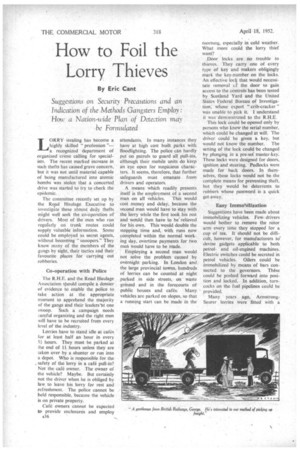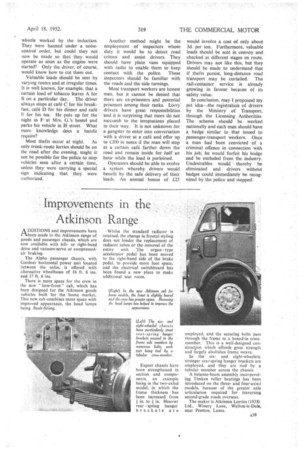How to Foil the Lorry Thieves
Page 46

Page 49

If you've noticed an error in this article please click here to report it so we can fix it.
By Eric Cant Suggestions on Security Precautions and an indication of the Methods Gangsters Employ : How a Nation-tvide Plan of Det ection may be Formulated.
4ORRY stealing has become a
highly skilled "profession "— a recognized department of organized crime calling for specialists. The recent marked increase in such thefts has caused grave concern, but it was not until material capable of being manufactured into atomic bombs was stolen that a concerted drive was started to try to cheek the epidemic. • The committee recently set up by the Road Haulage Executive to investigate these almost daily thefts might well seek the co-operation of drivers. Most of the men who run regularly on trunk routes could supply valuable information.. Some could be employed as secret agents, without becoming "snoopers." They know many of the members of the gangs by sight, their tactics and their favourite places for carrying out robberies.
Co-operation with Police The R.H.E. and the Road Haulage Association should compile a dossier. of evidence to enable the police totake action at the appropriate moment to apprehend the majority of the gangs and their leaders'at one swoop. Such a campaign needs areful organizing and the right men will have to be recruited from every level of the industry.
Lorries have to stand idle at cafes. for at least half an hour in every 51 hours. They mustbe parked at the end of II hours unless they are taken over by a shunter or run into a depot. Who is responsible for the safety of the lorry in a café pull-in? Not the café owner. The owner of the vehicle? Maybe. But certainly not the driver when he is obliged by law, to leave his lorry for rest and refreshment. The police cannot be held responsible, because the vehicle is on private property.
Café owners cannot be expected to provide enclosures and employ A36
attendants, In many instances they have at high cost built parks with floodlighting. The police can hardly put on patrols to guard all pull-ins, although their mobile units do keep an eye open for suspicious characters. It seetins, therefore, that further safeguards miist emanate from drivers and operators.
A means which readily presents itself is the employment of a second
man on all Vehicles. This would cost money anddelay, because the second man would have to stay with the lorry while the first took his rest and would then have to be-relieved for his own. This would double the stopping time and, with runs now completed within the normal working day, overtime payments for two men would have to be made.
Employing .a second man would not solve the problem caused by overnight parking. In London and the large provincial towns, hundreds of lorries can be counted at night parked in side streets; on waste ground and in the forecourts of public houses and cafe's. Many vehicles are parked on slopes, so that a running start can be made in the
morning, especially in cold weather. What more could the lorry thief want?
Door locks are no trouble to thieves. They carry one of every type of key and makers obligingly mark the key-number on the locks. An effective loel that would necessitate removal ef the door to gain access to the controls has been tested by Scotland Yard and the United States Federal Bureau of Investigation; whose expert " crib-cracker " was unable to pick it. I understand it was demonstrated to the R.H.E.
This lock could be opened only by persons who knew the serial number, which could be changed at will. The driver could be given a key, but would not know the number. The setting of the lock could be changed by plunging in a pre-sef master-key. These locks were designed for doors, ignition and steering. Padlocks were made for back doors. In themselves, these locks would not be the complete means for preventing theft, but they would be deterrents to robbers whose password is a quick get-away.
Easy Immobilization
Suggestions have been made about immobilizing vehicles. Few, drivers would bother to remove the rotor arm every time they stopped for a cup of tea. It should not be difficult, however, for manufacturers to' devise gadgets applicable to both petroland oil-engined machines. Electric switches could be secreted in petrol vehicles. Oilers could be immobilized by means of bars connected to the governors. These could be pushed forward into position and locked. In addition, turncocks on the fuel pipelines could be provided.
Many years ago, ArmstrongSaitrer lorries were fitted with a whistle worked by the induction. They were banned under a noisecontrol order, but could they not now be made so that they would operate as soon as the engine were started? Only the driver, of course, would know how to cut them out.
Valuable loads should be sent by varying routes and at irregular times. It is well known, for example, that a certain load of tobacco leaves A for B on a particular day. The driver always stops at café C for his breakfast, café D for his dinner and café E for his tea. He puts up for the night in F at Mrs. G.'s hostel and parks his vehicle in H street. What more knowledge does a bandit require?
Most thefts occur at night. As only trunk-route lorries• should be on the road after the evening, might it not be possible for the police to stop vehicles seen after a certain time, unless they were carrying a special sign indicating that they were authorized. Another method might be the employment of inspectors whose duty it would be to detect road crimes and assist drivers. they should have • plain vans equipped with radio to enable them to keep contact with the police. These inspectors should be familiar with the roads and the side turnings.
Most transport workers are honest' men, but it cannot be denied that there are ex-prisoners and potential prisoners among their ranks. L'orry drivers have great responsibilities and it is surprising that more do not succumb to the temptations placed in their way. It is not unknown for a gangster to enter into conversation with a driver at a café and offer up to £200 in notes if the man will stop at a certain café 'farther down the road and remain inside for half an hour while the load is purloined.
Operators should be able to evolve a. system whereby drivers would benefit by the safe delivery of their loads. An annual bonus of £25 would involve a cost of only about 3d. per ton. Furthermore, valuable loads should be sent in convoy and checked at different stages en route. Drivers may not like this, but they should be made to understand that if thefts persist, long-distance road transport may be curtailed. The rail-container service is already growing in favour because of its safety value.
In conclusion, may I propound my pet idea—the registration of drivers by the Ministry of Transport, through the Licensing Authorities. The scheme should be worked nationally and each man should have a badge , similar to that issued to passenger-transport workers. Once a man had been convicted of a criminal offence in connection with his job, he would forfeit his badge and be excluded from the industry. Undesirables would thereby be eliminated and drivers without badges could immediately be recognized by the police and stopped.












































































